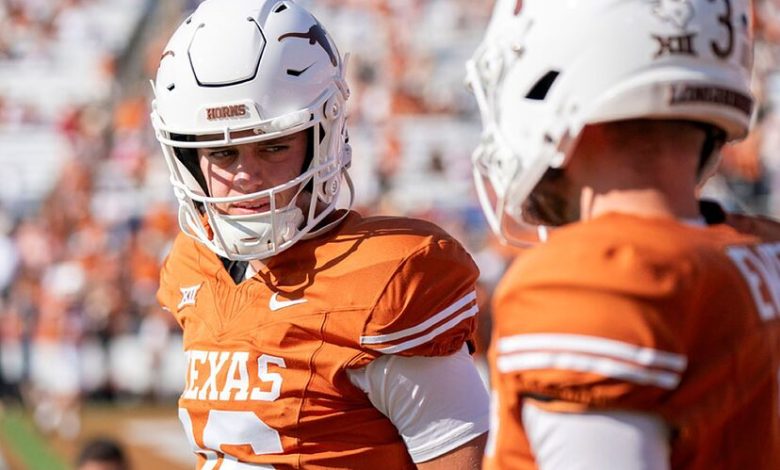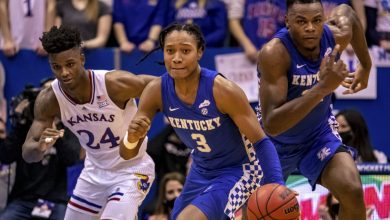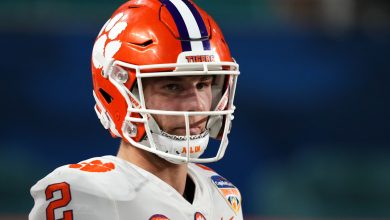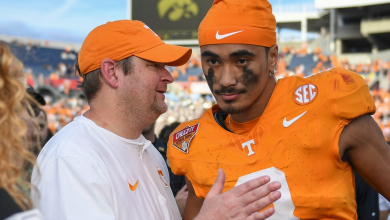Arch Manning just changed everything for Texas football and it’s bad news for Quinn Ewers NFL hopes

The Texas Longhorns have long been a program synonymous with both grandeur and high expectations, and with the arrival of Arch Manning, the stakes for Texas football have reached new heights. Known for his legendary family lineage – being the grandson of Archie Manning and the nephew of Peyton and Eli Manning – Arch’s decision to commit to Texas was a seismic shift not only for the Longhorns but also for the entire landscape of college football. For Quinn Ewers, Texas’ starting quarterback at the time, Manning’s arrival has injected new challenges into his career trajectory, and while it could be a blessing for the program, it also represents a challenge to Ewers’ own professional aspirations, particularly his hopes for a future in the NFL.
The Arch Manning Effect: A New Era for Texas Football
The Texas Longhorns have had a turbulent few years since their national championship run in 2005, struggling to find consistency and an elite quarterback to steer the ship. Enter Steve Sarkisian, the offensive-minded head coach hired in 2021 with the task of returning Texas to prominence. Sarkisian has made notable strides in recruiting, but it’s the 2023 commitment of Arch Manning that could be the most transformative moment in the program’s recent history.
Manning’s decision to play for the Longhorns, despite offers from programs like Alabama, Georgia, and Clemson, instantly elevated Texas football back into the national conversation. As a five-star recruit, Manning is viewed as a generational talent—an archetype of the quarterback who can win championships and help restore Texas to its glory days. His commitment was celebrated by fans and analysts alike, as it promises to bring national attention to a program that has been slowly rebuilding over the past few years.
However, as exciting as Manning’s arrival is for the Longhorns, it brings an unintended consequence for Quinn Ewers, Texas’ starting quarterback at the time of Manning’s commitment. Ewers, who transferred from Ohio State in 2021, was initially seen as the future of the program. Having been heralded as a top-tier prospect with all the physical tools necessary to thrive at the next level, his future looked bright. However, now, with the impending arrival of Manning, Ewers’ path to NFL success is suddenly filled with more obstacles than anticipated.
Quinn Ewers: From Hopeful Star to Under Pressure
Ewers, who played his high school football at Southlake Carroll in Texas, was one of the most highly regarded quarterbacks in the 2021 class. His 2021 recruitment was widely covered as a battle between top programs, and ultimately, he chose Ohio State, where he spent a season before transferring back home to Texas. His decision to return to his home state was lauded as an opportunity for him to shine in his home state and potentially help lead Texas back to prominence.
In his first season with Texas, Ewers showed flashes of brilliance, including a strong debut against Louisiana-Lafayette and promising play in several other contests. However, inconsistency was a theme throughout his first year as a starter, with moments of greatness followed by frustrating turnovers and lackluster performances in big games, most notably a defeat to Alabama in the 2022 season opener. Nevertheless, his raw potential was clear, and many still believed that if he refined his game, he could take Texas back to national relevance.
But now, with Manning joining the program, Ewers faces increased pressure. While the arrival of another talented quarterback may push him to improve, it also creates a complicated situation for his future in Texas and, more importantly, his aspirations of making it to the NFL.
What Does Arch Manning’s Arrival Mean for Quinn Ewers’ NFL Hopes?
At the heart of the issue for Ewers is the simple fact that Manning is now the face of Texas football. As the highly recruited, generational talent, Manning will inevitably receive a significant amount of attention, not just from fans and coaches but from NFL scouts. The Manning name alone brings with it a considerable amount of expectation and intrigue, and scouts will closely follow his development in the coming seasons.
For Ewers, this creates a precarious situation. The emergence of Manning could overshadow Ewers’ chances of asserting himself as the clear leader of the team, especially when Manning is widely viewed as the future of the program. With the immense pressure to deliver and the comparison to Manning looming over him, Ewers may find it more difficult to showcase his skills to NFL scouts.
Quarterback Competition at Texas: A Deep Talent Pool
Another significant factor in the situation is the depth of talent at the quarterback position in Texas. Along with Manning and Ewers, Texas also has Hudson Card, another quarterback prospect who was highly regarded coming out of high school. While Card has not garnered as much attention as Manning or Ewers, he has shown the ability to be a solid contributor in his limited playing time.
When a quarterback battle ensues between such a deep pool of talent, the competition for playing time becomes fierce. Ewers, as the returning starter, will likely have the upper hand initially, but with Manning’s presence, there is the possibility of a quarterback controversy that could lead to a division of fan and media support. While this type of competition can be healthy for a team, it often creates a volatile situation for individual players, especially those with aspirations of going pro.
NFL scouts closely follow the quarterback position, not only looking for talent but also leadership, poise under pressure, and the ability to handle competition. If Ewers struggles with the competition or doesn’t perform at a high level while Manning gets significant playing time, it could negatively impact Ewers’ stock in the eyes of NFL scouts.
Ewers’ Potential for the NFL: Still a Work in Progress
Despite the looming threat posed by Manning, Ewers still possesses all the physical traits that NFL teams covet in a quarterback. At 6’2″ and with a cannon for an arm, Ewers has the ability to make every throw on the field. His high school film showed a player who was capable of winning games with his arm strength and deep ball accuracy, and while his college career has had its ups and downs, there is still belief that, with the right coaching, he can develop into an NFL-caliber quarterback.
However, to make the leap to the NFL, Ewers must demonstrate consistent performance on the field. NFL teams are looking for quarterbacks who can lead their teams, make quick decisions under pressure, and avoid costly mistakes. If Ewers is sidelined by a more talented and widely regarded freshman quarterback like Manning, it will make it more difficult for him to showcase these qualities, as he could be competing for limited playing time.
Additionally, the increased focus on Manning could push Ewers into the background, making it harder for scouts to evaluate his development. Scouts typically prefer quarterbacks who show improvement year after year, but if Ewers is in a crowded quarterback room, the competition may stunt his growth as a player.
What’s Next for Quinn Ewers?
Ewers is now in a situation where he must either rise to the challenge or find an alternative route to get his NFL aspirations back on track. He can either compete with Manning for the starting job and prove his worth or consider transferring again, possibly seeking a fresh start at another program. Both routes come with significant risks.
Competing with Manning is undoubtedly difficult. Arch brings a level of talent that has been almost universally praised, and his potential could be enough to push Ewers to a backup role. However, if Ewers remains with the Longhorns and fights for his position, it could end up being a significant learning experience, whether he wins or loses the starting role.
Alternatively, transferring to a new program could offer Ewers a second shot at leading a team. However, transferring again would likely result in further disruption to his development, and he risks being labeled as a quarterback who struggles with consistency and commitment.









